|
|
|
監督:ビョン・ヨンジュ
Director : Byun Young-joo |
1966年生まれ。梨花女子大学卒業後、中央大学大学院で映画学を専攻。自主映画製作、とりわけ女性による映画製作運動に取り組む。ビデオ作品『私たちの子供たち』及び『戦列』を1991年本映画祭で、『アジアの女として』を1993年本映画祭で上映し、1995年出品の『ナヌムの家』でアジア部門小川紳介賞を受賞。 Born in 1966. After graduating from Ehwa Woman's University, studied Cinema at Jungang University Graduate School. Participated in Independent film productions, especially in women's film productions. Among her video works, Our Children and The Line Battle were screened at 1991 Yamagata Festival, and A Woman Being in Asia was screened at 1993 Yamagata Festival. Her first feature documentary on 16mm, Murmuring was screened as part of the New Asian Currents section of 1995 Yamagata Festival and awarded the Ogawa Shinsuke Prize. |
 |
|
|
監督のことば 習慣的な悲しみ。悲しみが習慣になる。それは、どんな理由からだったのだろうか。ハルモニたちはカメラに対して以前より能動的になり、こんな場面、あんな場面を映画に入れてほしいと何気なく求め、映画の内容を私より先に決めることもあった。そして時には、私が見ても照れくさいと感じられるほど大げさな、演技ならぬ演技を見せてくれるハルモニたち。そんなハルモニたちの姿を見つめながら、喜びではなく悲しみを、それも肩にはめられたままになっている枷のような習慣的な悲しみを感じた理由は、単にハルモニたちが第二次世界大戦当時、日本軍の慰安婦として連行されたという事実を記憶しているからではなかった。 カン・ドッキョンハルモニは、限りある命を生きなければならないことを知るやいなや、何よりも自分が人々に忘れられるかもしれないことを恐れた。彼女のように、過去50年あまり沈黙を貫いてきたハルモニが、ある瞬間、自分を世の中にさらけ出した時、最も恐れるのは、悩んだ末に恐怖に怯えながら慰安婦だったと名乗り出た勇気が、人々によって再び忘却の彼方に追いやられ、まるで、そんなことで世の中を変えられるなどとは夢にも思うなと言われているように感じることだろう。 それは、日常の中で、われわれ女性が悲しみを感じる習慣の源なのかもしれない。『ナヌムの家2』は私の映画ではない。戦争被害者としてのハルモニたちが世の中に示したいと思う、いくつかの日常や話を、私は彼女たちの代わりに画面に収めただけである。ただ、一つだけ私の意志で表現したいことがあった。それは、忘れまい、いや、忘れることができないという決心である。そう決心することこそが、私が5年間、世の中について学ぶことができるよう力を貸してくれたハルモニたちへの恩返しだと思うからである。 |
Director's Statement Habitual sadness. Why does sadness become habitual? These dear woman, harumoni, play a much more active role in this film than the one before. In casually pointing out certain scenes to be included, they decided on the content of the film even before I did. Their exaggerated acting some times embarrassed even myself. While intently watching these dear woman, I did not feel happiness but sadness. Like shackles binding their arms I felt this habitual sadness, and it wasn't just because I remembered the reality that they were hauled away and used as comfort woman by the Japanese Army. As soon as Kang Dok-yung realized her lifetime was limited, she feared nothing more than being forgotten. Like many woman who have lived in silence for the past fifty years, the thing she feared most when she revealed to the world that she had been a comfort woman, was that the courage it had taken to give out her name when so frightened would be pushed aside and once again forgotten. It's her dream that in coming forth she could have an effect on the world. Perhaps this is the source of the sadness we habitually feel in our daily lives as woman. Habitual Sadness is not my film. All I did was gather together what these woman wanted to show to world-their discussions and everyday lives. The one thing, however, that I would like to strongly emphasize is my determination of not to forget, perhaps unable to forget them. I think this determination is the only way that I can fulfill my gratitude, for these dear women that has given me the strength these past 5 years to learn about the world. |
